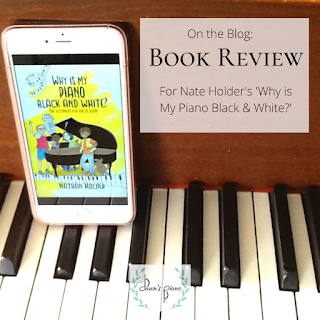Nate Holder book review
At the beginning of September a new book came out called Why is My Piano Black and White? by Nate Holder. I listened to an interview with the author on the Piano Parent Podcast discussing his earlier book I Wish I Didn't Quit as well as his upcoming release Why Is My Piano Black & White, and I really liked what he had to say so I pre-ordered a copy of the book. Today's blog post is part book review and part practical application with a few simple recommendations to how I think this book could be used at home to supplement a piano kid's musical journey, to grow their understanding of the instrument and to learn more about the long history of those who have played and composed on it.
The book doesn't read so much as a single story, but as a collection of short stories about various composers and artists starting with Classical music and working up through the 20th century. Once the book gets to the contemporary music, it splits out into genres instead of moving purely chronologically. I was really happy that Holder made this decision because as we start to consider Pop, Rock, Jazz, Blues, Gospel, Musicals, Film etc trying to cram all of our contemporary expressions of music into a single timeline is overwhelming AND it becomes much harder to see the progression of composers, artists and how they collaborate and influence each other's work. Within genres we are able to recognize these collaborative influences a lot easier. In addition to the composer bios and stories, the book is sprinkled throughout with facts and trivia about the piano, some are quite funny and whimsical while others are practical, and it works well as a way to keep the book light and interesting. And the final thing that really makes this book a great resource is at the back there are QR codes to spotify playlists that Holder has put together collecting works from the different composers and artists.
All in all, I really liked this book. I learned new things, especially about certain 20th century composers and artists who work in genres that I don't dig into as often, and I think it could be a really wonderful way to build a sense of music appreciation in young musicians. As far as using it at home, I would probably recommend to read one composer bio each day or each practice session. Most of them are not longer than a page or two and should only take a few minutes. If you are a family that does nonfiction as bedtime stories, this book could be a great one to add to the line-up, if not, try making a few minutes either before or after piano practice. After reading about the composer, listen to a couple of the songs by that composer in the playlist, and finally discuss what you all thought of the music.
To finish up today's post, I'll put a few music discussion questions to get you started.
- How does this music make you feel? or What do you think this piece is about?
- If your piano kid is stumped, you can frame this different ways. For example, 'if you were going to draw a picture for this song, what would it be?' or 'if this song was in a movie, what would be happening right now?'.
- There are no wrong answers for this question.
- What instrument(s) can you hear?
- What musical elements is the composer using?
- This is a good time to talk about things like dynamics (volume), rhythm, tempo, chord and tonality choices. For more advanced students, try to identify the time signature, and be descriptive about any different textures we hear in the music.
- Did you like it? Why or why not?
- This opens the door for students to develop their own sense of musical taste, while still recognizing the value of music that may not be their personal favorite. It's ok not to like everything, and there is still value in learning about it.
Before you know it your piano kid will be listening to music with an analytical ear, and speaking about nuances of what they hear with understanding and clarity, and they'll have a working knowledge of different genres, composers and artists!
